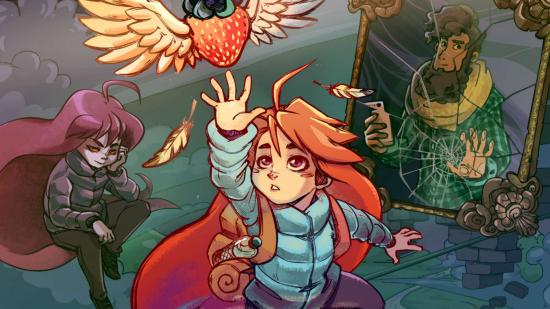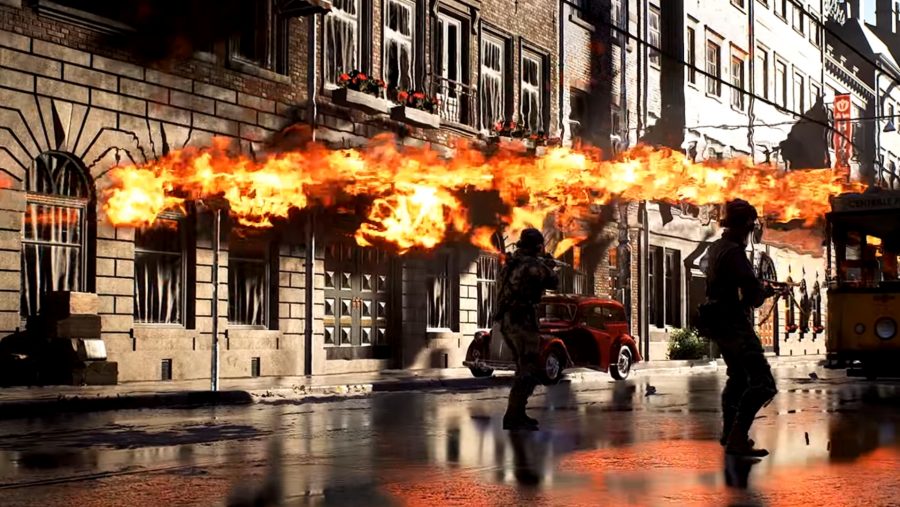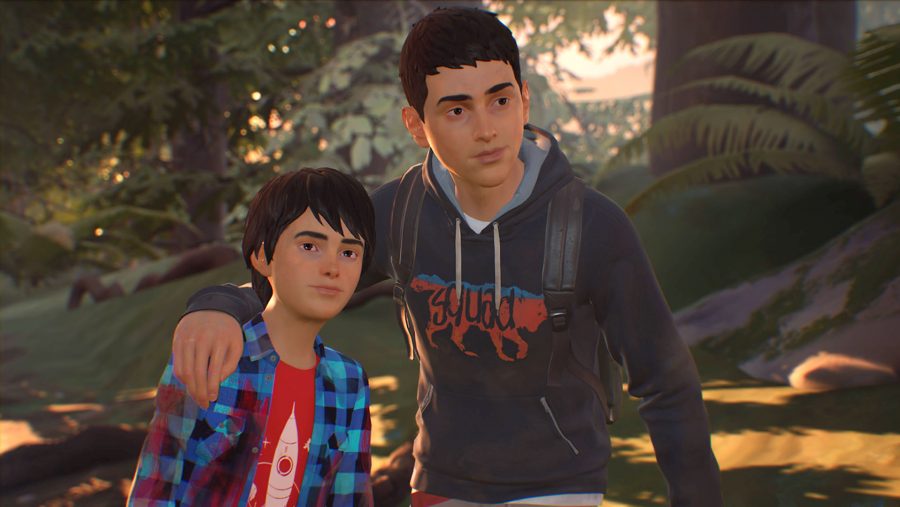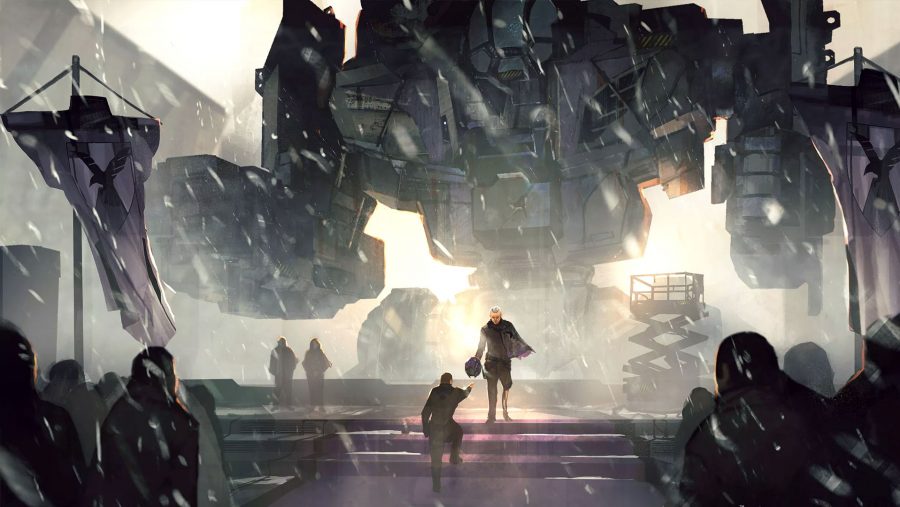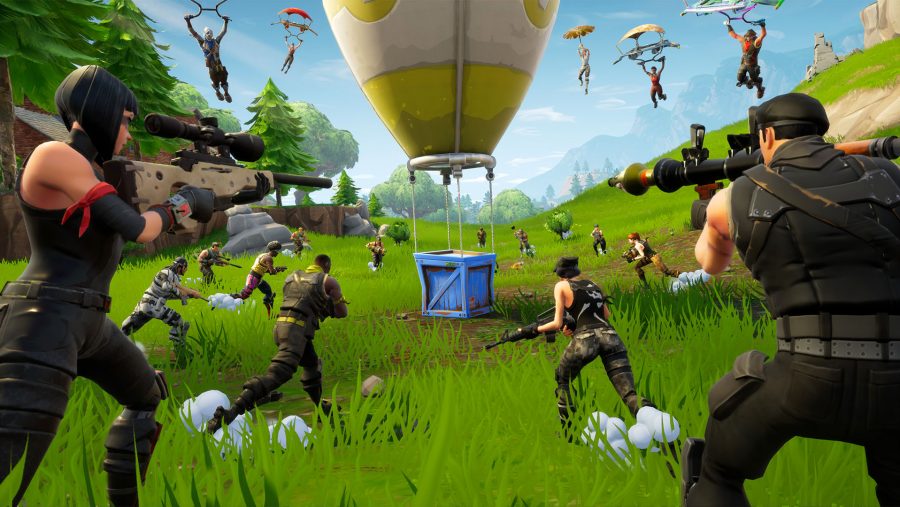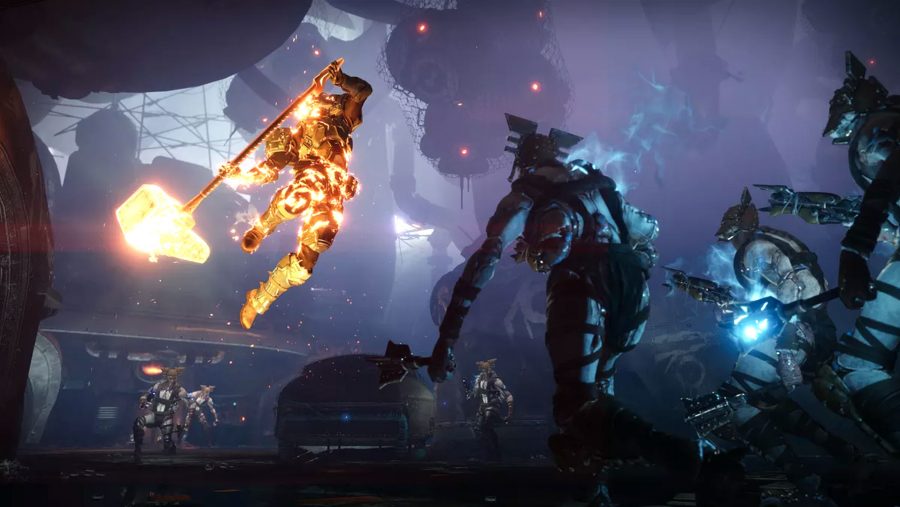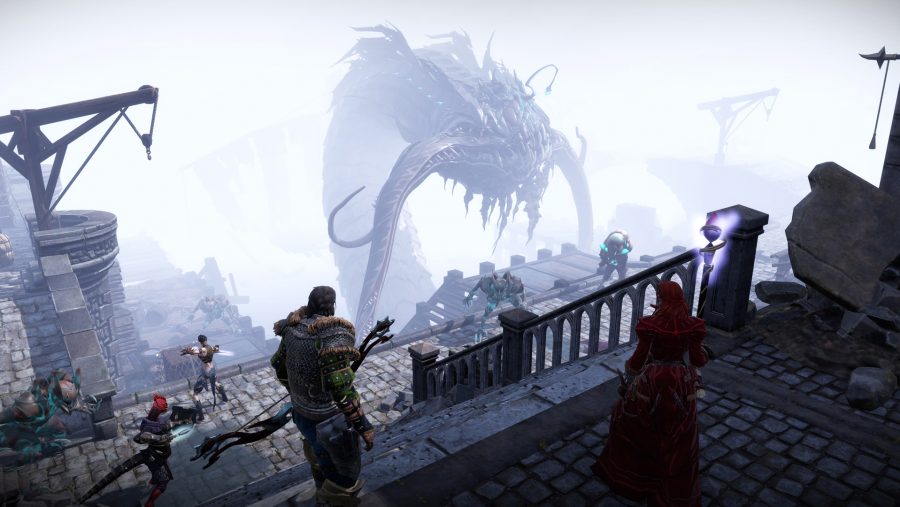It’s been a funny old year for PC gamers. We’ve enjoyed some colossal releases in 2018: heavyweights such as Battlefield V, Forza Horizon 4, Assassin’s Creed Odyssey, and Call of Duty: Black Ops 4 have collectively set a new high-water mark for production values. These are projects on the grandest of scales which push more envelopes than a postperson. Fallout 76 took a slightly different tack, of course, but let’s skim over that for now.
Meanwhile, the likes of Monster Hunter: World, Far Cry 5, Hitman 2, and Just Cause 4 delivered remarkable open-world experiences. Artifact and Battle for Azeroth divided audiences with the revisions they brought to their respective genres. And then, hovering over all of this like some sort of government-sanctioned, human-engineered fake moon, was Fortnite, somehow still dominating games – let alone PC games – despite having launched last year.
But for all of this high-impact, big-budget bluster, 2018 was also the year that triple-A projects were outshone by indie developers. Iteration, slick user experiences, and cinematic grandiosity are all very well, but the real gameplay innovations were born from much smaller budgets.
Even with that in mind, our pick for PCGamesN’s game of the year may come as a surprise to anyone who’s spent as many happy hours as we have with Blackout, wandering around Ancient Greece, or tearing through the UK’s countryside in a supercar. But after plenty of heated debate, we feel that it’s absolutely the right choice. So, let’s proceed.
Game of the year: Celeste
She’s called Madeline. The girl with the bright orange hair in the puffer jacket. Celeste is the mountain. Thought it best to get that point of confusion out the way before it became the new Zelda and Link.
Only, can they be separated? The protagonist and the challenge are intertwined, the mountain a big ol’ metaphor for the forces of anxiety and depression that keep Madeline from achieving her personal goals. The breathlessness that overcomes the attempt, the fall back to Earth that follows a knockback – it’s all there, theme and mechanics bound together, just as Madeline is tied to the dark double that follows her around.
It’s perhaps only right that Celeste, a game about a great self-reflective battle fought within the head of its player character, should prompt some introspection. This is a game we’ve written about only a couple of times before, and never reviewed: how can it possibly be PCGamesN’s game of the year? Yet it is, and that realisation has caused us to think on some hard truths about PC games in 2018.

The fact that Celeste has largely been absent from our front page is no reflection – that word again – of its quality. In a sense, PCGamesN is a mirror to its audience, like the one Madeline stares into during Celeste’s opening chapters. If you see a lot of stories about Fortnite, well, you can bet that’s because lots of PC gamers are enjoying Fortnite. It’s harder to introduce games; to evangelise those readers don’t yet care about.
But when we sat down to discuss the best games of 2018, we came to realise that triple-A had failed us. The experiments that had seemed exciting, like Far Cry 5’s storytelling or Fallout 76’s player encounters, hadn’t quite come off. The big-budget games that did come together, meanwhile, weren’t doing anything new.
Assassin’s Creed Odyssey is mesmerising, a shimmering mirage of a game, but has merely perfected a formula the series had invented for Origins – which, itself, took copious papyrus notes from The Witcher 3. Call of Duty, meanwhile, pulled off an audacious feat in abandoning the single-player stories that had made its name and pivoting to the latest phenomenon for Black Ops 4. But to celebrate Blackout as the greatest gaming achievement of the year felt wrong. Iteration alone is not enough.
It’s only right to point out that Celeste, too, stands on the shoulders of others to reach its summit. It belongs to a subgenre of platformer we thought had peaked in the late ‘00s, with Super Meat Boy, VVVVVV, and N+. Like these games, Celeste pinpoints a fundamental joy in the medium – that of accelerated mastery. Of taking a set of unfamiliar systems, coming to understand them, and then showing off that new knowledge with flair. While 10,000 hours of guitar practice can make you an expert, videogames can do it in tens of hours, and Celeste in minutes.
Related: Check out the best indie games on PC
Frequently, a screen in Celeste can seem insurmountable. Contact with a single spike is lethal. But that sudden death is a gift, allowing you to learn from your mistake at the point it happened. Since you reset instantly to the same screen – the action you took still fresh in your mind, altered with a flick of the analogue stick – you can correct the error. Then you move onto the next semi-second of impossibility, until eventually, the whole screen is possible.
By the end, Celeste turns out to be the game that game capture was made for – partly to show off to friends, but primarily to prove to yourself that you really did that.
It would be more than fine for Celeste to be a prime example of its kind. But we’re not here to celebrate iteration alone. What Celeste does uniquely is make that mastery over the impossible mean something – binding the mountain inextricably to Madeline’s personal battle. It’s significant that this is a platformer not so much about reaching the right side of the screen, but the top of it – the fight not against enemies but the constant downward pressure, the gravity that causes you to lose your grip and slide backwards.
Read more: Why Celeste is Harry’s game of the year
The pioneering British explorer George Mallory, via JFK, said he would climb Everest “because it’s there.” That’s not Celeste. Madeline isn’t mastering the mountain for its own sake, but to force herself to find the tools to face life’s challenges. If it sounds like she’s giving herself a hard time, you may be onto something. Hers is a very specific fight with mental illness, but in that specificity Celeste nails something universal – the hostility with which we can treat ourselves at our lowest points. In 2018 it’s a game without peer, and that fact needs shouting from the highest peaks. This one is the tallest we’ve got. Hopefully we’ve learned something on the way up.
Honourable mention: Artifact
Best technical achievement: Battlefield V ray tracing
The latest Battlefield game gets our tech achievement award this year as the first game to successfully fold real-time ray tracing elements into its game engine, without automatically relegating the frame rate to little more than a slide show.
You’ll need one of the latest GeForce graphics cards to gain access to the super-special new effects, as a result of DICE and Nvidia’s collaboration on getting the tech working, but we can assure you that it looks spectacular.

In Battlefield 5, DICE has used real-time ray tracing to create all the reflections on surfaces used in the game, from the windows of a soon-to-be-blown-out building in Rotterdam to the puddles you stomp through on your way to the next capture point. It’s not just the shiniest of shiny surfaces either – even the dull, slightly polished wooden stock of your rifle will show up a distorted reflection of the world around you.
Read more: Why Battlefield V is Dave’s game of the year
But what the hell is ray tracing? Essentially, it’s a method of tracking rays of light through a scene, and is being used here to map visually accurate reflections where traditionally developers would use fake, low-fidelity, pre-canned reflections. Ray tracing is far more realistic. Though that does mean the game now looks how your eyes think it should, so you might only see its true majesty when it’s not there. But you won’t miss the frame rate penalty this high-end tech inevitably brings…
Honourable mention: Fortnite crossplay
Best narrative: Life is Strange 2
It would have been easy for developer Dontnod Entertainment to shy away from the current political climate in America. But to do so would have been a disservice to Life is Strange 2’s main characters, Sean and Daniel Diaz, two Hispanic brothers growing up in contemporary America. The first episode alone features police brutality, systemic racism, and the border wall, but the story is as touching and characterful as the series has ever been, without the narrative ever feeling forced.
Read more: Why Life is Strange 2 is Jacob’s game of year
We’re only one episode into the new series of Life is Strange but already it has marked itself out as a high point in storytelling. At a time when many developers downplay the political parallels within their games, or avoid depictions of real-world events entirely, we should celebrate those games that wholeheartedly reflect our society and challenge the status quo. In 2018, no game has embraced that ideal to the same extent as Life is Strange 2.
Honourable mention: Assassin’s Creed: Odyssey
Most PC game: BattleTech
There are mech games on console but none of them with the strategic depth and complexity of BattleTech. Unlike XCOM, where you command squads of fleshy vulnerable humans that can be eviscerated by a single swipe of an alien’s claws, in BattleTech your troops are multi-story, heavy metal machines. Mechs are wrapped in layers of armour that has to be peeled away with sustained fire. The sheer challenge of destroying a mech teaches you to flank mechs so your squad all fire at the same side of an enemy machine – focusing their fire to drill down to their target’s core.
BattleTech requires patience, both on the battlefield and in the MechLab where you can refit almost every aspect of your steel soldiers. You need to spend time learning the pros and cons of each weapon, mitigating the weaknesses of hot-running lasers with heatsinks, putting extra armour around explosive missile pods, and calculating how much autocannon ammo you actually need to take into battle. It’s a meticulous process.
Read more: Learn more about this gem in our BattleTech review
It’s a game built to be played while sitting back in your chair, cup of tea gently steaming beside you, as you mull over the benefits of shooting an enemy mech with a full spread of lasers or simply walking up to them and punching them in the cockpit.
Honourable mention: Total War: Warhammer II
Ongoing game of the year: Fortnite
Can anything stop Fortnite? Nope, not if this year has taught us anything. Epic Games’ battle royale behemoth started 2018 as the underdog behind Brendan Greene’s PUBG, but now it’s beating off triple-A would-be usurpers Dying Light and Call of Duty: Black Ops 4 to establish itself as the undisputed Victory Royale king. The innately enticing genre has combined with its free-to-play pricing structure to see Fork Knife (as your well-meaning nan calls it) ascend from videogame to global institution.
This Fortnite fever dream of a year let you, as Marvel maniac, Thanos, wield the Infinity Gauntlet. It helped Epic launch a storefront to rival Steam. Players stopped to watch a massive purple cube called Kevin propel a lake in the sky and explode the floating island into an ethereal shower of runes. It’s made millionaires of streamers and catapulted them to fame with gameplay sessions alongside Drake and the Tottenham Hotspur football team. It leaves medical professionals dumbstruck by young people’s sudden interest in their own dental hygiene.
Read more: Full up on Fortnite? Here are the best shooters on PC
Fortnite is now officially too big to fail: next year, prepare for governments to stockpile V-Bucks as their primary reserve currency and for us all to communicate exclusively in emotes as we bow down to new king of the world, Tim Sweeney. Or something.
Honourable mention: Destiny 2
Best DLC: Destiny 2 – Forsaken
In both quality and quantity Forsaken surpasses all expectations for a Destiny expansion: its lengthy campaign tells the series’s best story yet (not that that’s saying much); it adds not one but two new locations; its raid is Destiny’s biggest and best; and it adds an inventive new game mode with Gambit.
Read more: Why Destiny 2: Forsaken is Rich’s game of the year
But it goes further. By revising weapon slots, perk rolls, and challenges; reintroducing bounties; and adding the Collections and Triumphs features; Forsaken overhauls Destiny 2’s incentive systems. There’s always something rewarding to do when you log in. Not even the most hardcore players can get bored now.
There’s always salt in the subreddit, but these days it’s things like how One-Eyed Mask is a total piss-take (it is). It’s the largely good-spirited, shitpost-based grumbling of a community that nonetheless likes the game they’re playing.
Compare that to this time last year. One-use shaders, an XP throttling scandal, a truly pathetic DLC, and a miserly seasonal event had convinced players that Bungie was a mean-spirited, greedy, or incompetent studio. The subreddit was a fetid swamp of bile.
So by any reasonable metric, Forsaken has been a resounding success (which makes Activision’s disappointment in it so absurd, and so worrisome). It’s rescued Destiny from a lower low, and raised it to a higher high, than The Taken King expansion. It’s comfortably the most impressive piece of DLC of 2018.
Honourable Mention: Total War: Warhammer II – Tomb Kings
Biggest surprise of the year: Divinity: Original Sin 2
One of the best games of 2017 was Divinity: Original Sin 2. It could also have easily taken the crown for 2018, too, thanks to the Definitive Edition of the game that shipped this year. It’s easy to think of this version as the console port, as it was the edition that brought Original Sin 2 to Xbox and PlayStation, but that would downplay the astonishing number of additions and changes that developer Larian added to the game.
Let’s start with 150,000 words of re-written and re-recorded dialogue (that’s more than the entirety of Harry Potter and the Prisoner of Azkaban). There are whole storylines that have been reshaped to better clarify and foreshadow events. And then, of course, there’s the redesigned final chapter of the game, which offers a more satisfying conclusion to the epic tale. Oh, and let’s not forget the new mission where you help out a squirrel who’s also a knight.
Read more: Look closer at what’s changed in Divinity: Original Sin 2
The biggest surprise of the year is that Larian was somehow able to make one of the best games of all time even better. And there’s nothing more PC than constantly tweaking, altering, and rebuilding something until it’s practically perfect in every way.
Honourable mention: Epic Games store
So there we have it. Do you agree with our choices? Of course you don’t – let us know why not in the comments. It’s been a remarkable and surprising year in PC gaming for so many reasons, but for every negative there have been plenty of positives, too. And from this unusually uncertain position, who knows where 2019 will take us? We certainly can’t wait to find out.
